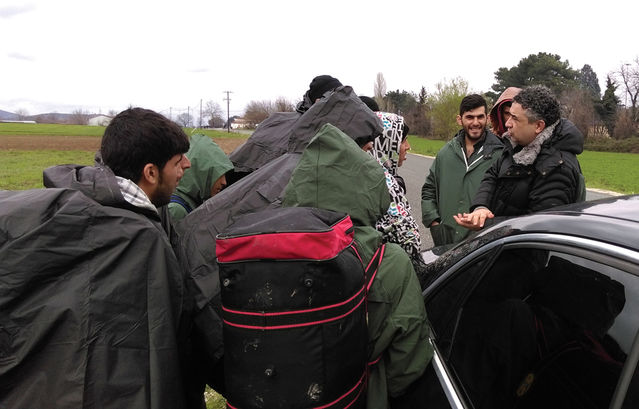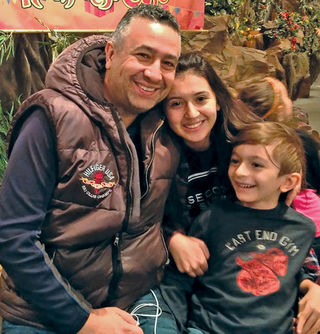From Daring To Dispossessed
A Syrian hospital administrator saw his country descend into horror. Since fleeing to the United States, he's made it his mission to help those left behind.
By Shadi Martini and Jennifer Bleyer published July 5, 2016 - last reviewed on January 30, 2017
I grew up in Aleppo, the most populous city in northern Syria. My parents, who are both physicians, own a private hospital there. I'm the youngest of four—my two brothers are also physicians and my sister is an architect. After graduating from high school, I went to an American college in Beirut, and from there I moved to Bulgaria, where I established a manufacturing business and met my wife. We have two children. In 2008, I went back to Syria to run my family's hospital. We were prominent and respected. I was living the good life.

When the Arab Spring began in Tunisia, in 2010, it was something we never imagined could happen in the Middle East. We thought: Is it going to come to Syria? Is it going to affect us? Even though we in the upper class were comfortable, we knew that our country was full of problems. In March 2011, students in the south of the country mounted nonviolent protests against the oppressive regime of Bashar al-Assad, and the government responded with shocking brutality. Protesters were beaten and shot. Some were killed, and their grieving parents were told to just forget about them, to go make new children.
Demonstrations against the government erupted elsewhere in Syria and kept snowballing for about two months until they came to Aleppo. Because our hospital is close to the university where the protests were based, we found ourselves treating a lot of demonstrators who'd been hurt. Soon, all the different branches of secret police came and told us we had to contact them if we had any injured protesters in our emergency room. The protesters stopped coming to the hospital and looked for ways to get medical care without being detected, but even that became difficult. One doctor we knew of who was secretly treating protesters was kidnapped by the authorities, tortured, and killed. It was a message: If you help them, this is what's going to happen to you.
Things became increasingly dangerous. One man who worked in the reception area of my hospital was taken by the authorities even though he wasn't at all politically active. It was a case of mistaken identity—he had the same name as someone they wanted. We managed to clarify the mistake and get him released, and when he came out, he told us how they'd taken him to a dark underground cell, stripped him naked, and put him in a barrel of ice-cold water. Then they hung him by his wrists so his feet couldn't touch the ground, beat him, and subjected his body to electric shocks. They tortured him for two days.
Some people I knew, even those I'd grown up with and loved, adopted strange attitudes, as if it were acceptable for other Syrians to be maimed or killed as long as the government stayed in power. They were motivated by self-preservation and a desire for their own interests to remain intact. But I felt a responsibility to do something. The military was surrounding cities and cutting the population off from food, water, medicine, telephones, and electricity. Along with some physician friends and other healthcare colleagues, I agreed to buy medical supplies and equipment under the cover of our facilities and send them through a smuggling network. We knew that being caught held the risk of death, but we couldn't ignore what was going on. It worked well for a while—one person in our group was known to just one contact in the Aleppo resistance. We didn't know where the stuff was going or to whom. Then the authorities caught some of the core people facilitating the smuggling, people who knew others along the chain. That's when I knew it was time to go.
I had already brought my wife and children back to Bulgaria, where it was safe. The European citizenship I'd acquired by virtue of marriage enabled me to move around and leave the country more easily than people with only a Syrian passport. Still, departing Aleppo in 2012 was a very heavy burden for me, not knowing whether I would ever go back to my home, my neighborhood, my town. I lost everything, leaving with just one bag of clothes. My parents, who are in their 80s, chose to stay. They feel that if they must die, they prefer it to be in the place where they've lived almost their entire lives, not somewhere else. I don't know whether I will ever see them again.
Not long after I left Aleppo, I brought my family to the United States. I had won the green card lottery as a Bulgarian national. I was no stranger to America: My sister has lived in Michigan for 20 years, one of my brothers has lived in Seattle for more than 10 years, and I'd visited them often. Michigan, which has the largest concentration of Syrians in the United States, felt particularly familiar—I knew all the streets and how to get around. I'd often thought about moving there before, but I had such a good life in Syria. After it became clear that things were going very wrong there, though, my internal debate was over.
So I moved my family to Farmington Hills, Michigan and put the children in public school. I've remained involved in the crisis, repeatedly going back both to parts of northern Syria that are outside of government control and where internally displaced people have amassed, and to areas of Turkey and the Balkans to which refugees have fled. The war in Syria has now produced five million refugees—a quarter of the world's total—and over six million internally displaced people. For the past four years I've been helping those who are applying for resettlement in other countries as well as those who are resettled, so I've seen all phases of the situation.

Applying for resettlement is a terrible experience, especially for refugees seeking to live in the United States. A refugee by definition is someone whose life has been threatened; most such people are highly traumatized. But in applying for resettlement, they have to sit across from a person, often several people, who ask them about the ordeals they've endured in a way that's almost antagonistic. They're treated as if they're lying because they don't have proof of what happened to them—all they have is their own word. I often have the feeling that resettlement employees' training is all about figuring out who's lying and who's telling the truth, rather than being compassionate and sensitive to suffering.
Nor is resettled life easy. Refugees tend to have very high hopes that just by getting somewhere safe, all their problems will be solved. Once resettled, they must face new issues, such as finding work and a place to live, putting their children in a new school, and living where they don't speak the language. Expecting one thing and finding a different reality brings its own share of shocks.
The United States is one of the few countries that's not responding to the massive quagmire in Syria, having taken in fewer than 2,500 Syrians as refugees since 2011. Most of the time, the country accepts half of the refugees referred to it by the United Nations for resettlement consideration, but not in this case, even though the vetting process for Syrians is much more intensive than for refugees from elsewhere. I believe that the overwhelming majority of Americans are good-hearted people who value being a nation of immigrants, but general attitudes have shifted from sympathy to antipathy to refugees, especially Muslims. Americans associate Muslims with ISIS, but ISIS represents only a tiny minority of Muslims—they're like a cult. Ninety-nine percent of Muslims, like me, don't agree at all with what groups like that are saying, and we're also on the front lines fighting and being killed by them. We know how dangerous they are. Muslims don't need to be feared and attacked as a whole. They need to be helped to get rid of those wackos out there.
I think all of us who have lived through this period in Syria have experienced trauma. I've seen so many horrific things. I was in an aerial bombardment with bombs falling a hundred feet away from me. At the hospital, we would sometimes be delivered a body in a bucket, a whole body. One of my friends disappeared for three months, and when he reappeared there was no skin on his feet, only bones. He managed to save his legs, but he limps now. I don't even know where many other friends are—we've lost track of them. There are so many things we try to block from our memory. It's hard to go on with life with these mental scars, but we must.
Shadi Martini is a senior advisor for the Multifaith Alliance for Syrian Refugees.
